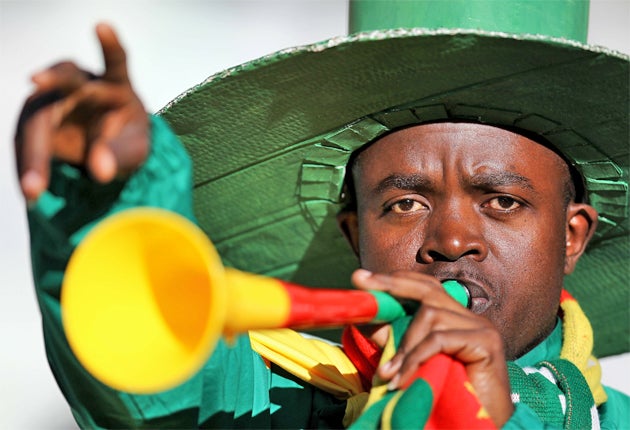The Week in Radio: A debate that's full of sound and fury

It's non-stop, it's unrelenting, it has a single, unvarying tone. No, it's not the vuvuzela. It's the sound of people complaining about it.
Nicky Campbell on World Cup Breakfast on Five Live devoted a whole programme to the issue of the moment, and the results divided predictably on national lines. The English hated it, "Completely inappropriate", but the Africans were pretty unanimous. The vuvuzela is "our national culture".
Well, talking about football is our national culture, and given that the African national instrument has rendered it unbearable actually to watch, talking, or rather pontificating, expounding and whingeing, attains ever greater importance. Even a novice can pick up the armchair basics, though the approach varies, depending on who you're listening to. TalkSport does exactly what it says on the tin, with occasional, fascinating insights such as the specialised psychology required by goalkeepers who need to "prepare for trauma". Radio 2 tried comedy with Never Write off the Germans, described as "the Theo Walcott of panel games, fast, lots of potential, and we didn't go to the World Cup either", but in the event it was not that much funnier than drawing with the USA.
Sing When You're Winning focused on that aspect of football that expresses "something fundamental from our evolutionary past, a complex, sophisticated cultural activity and an almost spiritual feeling". By which Professor Steven Mithen meant the football chant. A history of this neglected art form was undertaken by Ian McMillan, resident poet at Barnsley FC, though why a football club needs a resident poet is a mystery when some of the wittiest instant poetry emanates from the stands. A documentary about football chants throws up similar challenges to programmes about, say, the history of cursing. None of the good stuff can be repeated on radio, so all those brilliant, rude chants my brothers came back singing, simply didn't feature. There were some beguiling snippets, however, such as how "I'm Forever Blowing Bubbles" was adopted by West Ham because the Pears soap factory was in Canning Town, and how Elgar was inspired to create the first football chant for Wolverhampton Wanderers. It was called "He Banged the Leather for Goal", and proved less catchy than his later composition, "Land of Hope and Glory", more popularly known to millions as "We hate Nottingham Forest".
The ultimate England/Germany match was still pending 70 odd years ago when numerous well-born young women flocked to Germany to finish their education and as often as not found themselves fraternising with storm-troopers, if not taking tea with the Führer himself. Dancing with the Devil was a riveting slice of history in which Rachel Johnson coaxed unguarded, eyewitness accounts from nonagenarians with quavery, cut-glass accents, among them her own grandmother and mother-in-law. "It was fairyland, Germany, everybody had a purpose!" said Margaret Budd, who admired the Hitler Youth and cheerfully sang the Horst Wessel song from memory. Strikingly, almost all these women said they had seen nothing to alarm them. Margaret Budd recalled seeing a sign at the swimming pool saying "Jews Not Welcome", but how could she know what it meant? "I'd never met any Jews." When one girl kept a notebook of all the nice German boys she'd met, with a cross by the ones she liked, the Gestapo turned up, assuming she was a spy.
This programme was an invaluable addition to the oral history of the period. Given the force of hindsight, you couldn't help but acknowledge these women's honesty in not revising their recollections. As one lady who accompanied Unity to dinner with Hitler at his favourite Munich eatery said, "Hitler and Hess were full of charm and very good mannered, praising the royal family and saying what a beautiful country England was." But all the time she was thinking, "what an awful, squalid little place to take a girlfriend to supper!"
Join our commenting forum
Join thought-provoking conversations, follow other Independent readers and see their replies
Comments